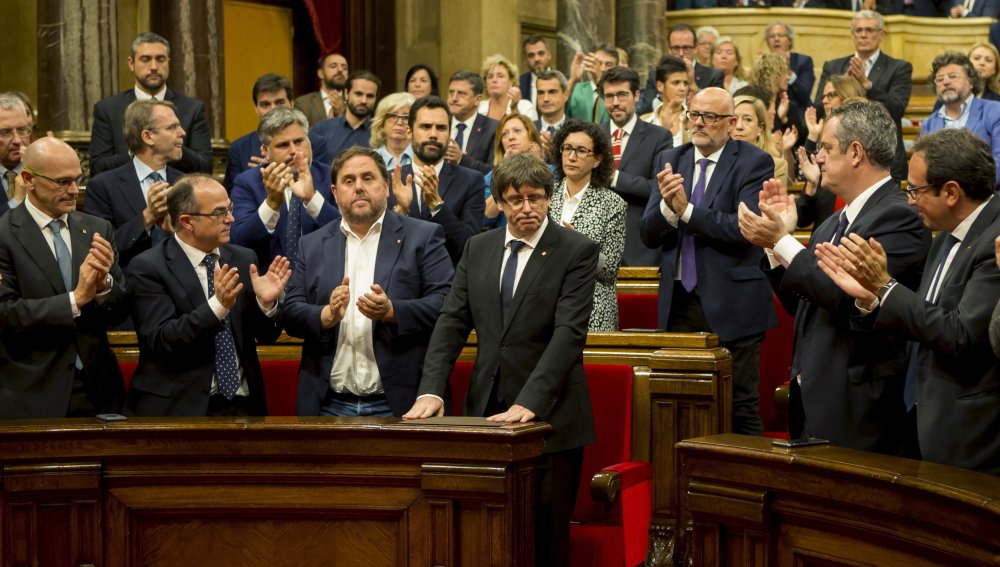On Tuesday, Catalan President Puigdemont “declared Catalonia’s independence,” but soon after suspended its effects in favor of dialogue with Spanish authorities. His decision came after numerous international actors suggested that mediation would only be possible if he halted independence as a sign of good faith.
Nevertheless, numerous members of parliament, who were informed about Puigdemont’s decision only 45 minutes before his intervention, expressed their disagreement and threatened to boycott his speech, as well as threatening to break the pro-independence absolute majority in Parliament. They stressed that they had agreed on a different declaration earlier in the day.
To address this alarming situation, President of Parliament Forcadell decided to suspend the plenary for 1 hour. While the disagreements remained, everyone present in the meeting finally accepted Puigdemont’s changes to the speech in order to maintain unity. Additionally, they agreed to hold a ceremony to sign an unofficial declaration of independence in another building after the plenary in order to give more solemnity to the day.
Tens of thousands of people who gathered around the parliament to celebrate the proclamation of the new Catalonian Republic ended up with mixed feelings. At first, when Puigdemont declared independence, they felt very excited, but this turned to disappointment when he suspended its legal effects without setting a deadline a few seconds later.
Most experts saw Puigdemont’s move as a wise one because it served to show the international community that Catalonia is seeking dialogue until the very end, which favours future international recognition of Catalonia as an independent country.
On Wednesday, Spanish PM Rajoy refused Puigdemont’s latest offer of dialogue and activated Article 155, which can be fully implemented a few days after Puigdemont responds to a mandatory request for information as to whether he has declared independence. He was given until Monday to respond; if it is in the affirmative, this period is extended until Thursday, with the option of altering the decision.
With Article 155, Rajoy can suspend Catalonia’s government, intervene in the education system and the police, and even call for an early election while installing technocrats from the central government to rule Catalonia for at least 3 months. In parallel, pro-independence parties and organizations may also be barred from participating in any eventual general election for at least 4 years.
Major pro-independence organizations are preparing a proportionate response to the implementation of the Article 155 and the possible arrest of Catalonia’s President and vice-president, which includes mass protests, and an indefinite general strike. The main idea would be to collapse the Spanish and European economies and eventually force an international intervention/mediation in Catalonia.
The response may be precipitated by Spain this Monday, because the leaders of the two major pro-independence organizations, Cuixart and Sanchez, have been summoned by the Spanish National Court to testify about “sedition charges” (punishable by up to 15 years in prison + a fine). According to some journalists with contacts in the Spanish government, the judges who are hearing these two cases have already made the decision to jail them in order to smash their respective organizations and thus spread fear across Catalonian society.
Against this possible outcome, Cuixart and Sanchez named their replacements on Saturday. In the meantime, pro-independence organizations and parties such as the ANC, Omnium, ERC, CUP, Democrates and several MP’s from the PDECAT have called on Puigdemont to lift the suspension of Catalonia’s declaration of independence and implement its legal effects as soon as next week. If possible before the Spanish implementation of Article 155.They believe there are no longer grounds for mediation or negotiations as equals with Spain, and that the only way to bring about international mediation/negotiations is by formally declaring independence first.
With this in mind, Puigdemont will have to make the most important decision of his life tomorrow morning. He must decide whether to go all-out to respect the will of the Catalonian people and face a prison sentence of up to 15 years or to surrender, refuse to declare independence, and thus comply with the Spanish government’s will.
Whatever Puigdemont’s decision may be in the coming hours, the worsening of the conflict between Catalonia and Spain appears to be inevitable, given that if he surrenders the independence process, millions of Catalans will then feel betrayed, resulting in the radicalization of many who would rise up against the Spanish government in order to defend the newly promised Catalonian Republic.
Perhaps the only thing that can stop this upcoming clash would be Spain’s acceptance of international mediation. Although, I must admit that I do not have much hope of that happening.

Thank you for so clearly laying out the current situation. I am watching with baited breath and the hopes that Catalonia earns the freedom to self-govern with no loss of life or jailtime.
LikeLiked by 3 people